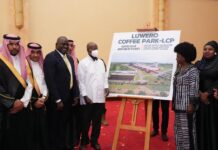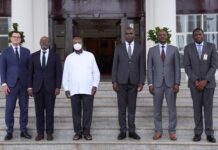By URN
 Fred Balikenda, a resident of Kirama Vilage, Kigwera Subcounty in Buliisa District has been liing in a fenced house for a few months now, courtesy of the oil and gas activities in the area. This is where the Tilenga Project which is being developed by TotalEnergies in the Lake Albert basin.
Fred Balikenda, a resident of Kirama Vilage, Kigwera Subcounty in Buliisa District has been liing in a fenced house for a few months now, courtesy of the oil and gas activities in the area. This is where the Tilenga Project which is being developed by TotalEnergies in the Lake Albert basin.
Balikenda’s current situation is not because he is a beneficiary of the compensation by the oil and gas company or the government of Uganda.
On the contrary, it is because the mid-fifties old has refused to vacate his house and land until either being given what he demands or satisfactorily losing a case in court.
He says he was among those who were supposed to be given new houses in the same area where he would relocate and surrender the current home for the oil projects to proceed. However, he was surprised to see workers descend on his home with materials ready to start fencing it off. He says he is ready to die in the fence and make history unless he is given what is due to him.
Balikenda is one of the few Project-Affected Persons (PAPs) who have pending and varying grievances regarding compensation for their land and other properties.
Apart from the Tilenga and Kingfisher oil development sites, there are other associated infrastructure facilities being constructed, including central processing facilities and flow lines linking them to the wells, the feeder pipelines linking the CPFs to the export hub and refinery at Kabaale, Hoima.
From the Kabaale Industrial Park, there are two pipelines, one exporting crude through Tanzania (EACOP) and the other transporting refined products to the storage facilities in Mpigi.
Jelousy Mugisha, who has been affected by the Tilenga CPF says he and some of his village-mates, have until now rejected the total of 3.5 million shillings that the government is ‘forcing’ them to accept, saying that they value their land and properties on them at 21 million shillings per acre.
John Tunduru, the Chairperson of the affected persons who are holding out, explains that government’s offer does not even measure up to the district valuation of the land.
The Petroleum Authority of Uganda, PAU, which is the regulator of the activities insists that the rates are determined taking into considerations many market dynamics including the district valuation rates.
PAU says there have been avenues though which the land grievances have been handled, with court action being the last report, according to Ali Ssekatawa, the Director Legal and Corporate Affairs at PAU.
“The process has a multicentred grievance mechanism which is structured like the LC system but involves the PAPs, their leaders, government officers, PAU, consultants, CSOs and oil companies before submission to court. No wonder, that less than 2% of the grievances have required court adjudication,” he says.
But Tunduru says the court system seem to favour the oil companies and the government, not because the PAPs lose cases, but because their cases are not given hearing priorities.
He says for example, that when they rejected the 3.5 million, they were taken to court but there was no hearing and the case was judged against them just within six months.
However, their appeal in 2020 has so far taken more than two years.
The Africa Institute for Energy Governance (AFIEGO) and the Inclusive Green Economy Network East Africa (IGENEA) are some of the NGOs that have been operating in the oil areas especially calling for observance of the rights of the people and protection of the environment.
AFIEGO’s executive director, Dickens Kamugisha says there are more than seven cases pending in the courts of law from as far back as 2012, but adds that these are by the aggrieved PAPs, while those filed by the government are disposed of expeditiously.
He says that the complainants also face the challenges of the cases being moved from court to court as, as well as the changes in the hearing judges.
Amos Bazaale, who introduces himself as the clan leader of the Abasonga clan in Bugungu warns that the people are being pushed too far, especially on the delicate issue of land.
PAU says that the implementation of the resettlement action plans has surpassed the minimum standards set under the Ugandan law, the International Financial Corporation (IFC) Performance standards, and other international best practices.
“For instance, the Uganda law requires that the owner and land users are fully duly compensated before his or her land is accessed by the project developers. As at end of February 2023, resettlement and compensation stood at 99.5% for KFDA, 94% for Tilenga and 65% for the EACOP Project,” says Ssekatawa.
In 2019, the people petitioned parliament for help in addressing their concerns. Asked about whether the MPs have been helpful in anyway, they PAPs say their MPs advised them to take the position of the government or else they would lose everything.
Esther Abigaba, one of those affected, says that the parliament sent a team of members to the area and they returned with a report to the House. However, according to her, their suggestions and recommendations were defeated by the executive.
Meanwhile, AFIEGO’s Kamugisha says the NGO that sued TotalEnergies in France over its activities in Uganda, are planning to appeal the ruling.
Last week, the court dismissed the petition on grounds that it was wrongly filed and that the petitioners had changed their grounds along the way.
Kamugisha says that they are meeting with their lawyers on the best way for the next step.



